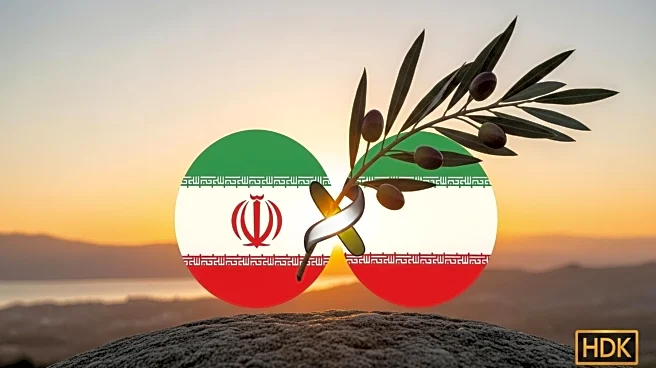What's Happening?
The Cyrus Accords propose a new framework for Israel-Iran relations, focusing on reviving historical ties between the two nations. This initiative envisions cooperation in a post-Islamic regime era, suggesting a pragmatic approach to diplomacy and regional stability. The accords are seen as a potential pathway to renewed collaboration, leveraging ancient connections to foster modern diplomatic and economic partnerships. Supporters of Iran's exiled Crown Prince Reza Pahlavi and pro-Israel demonstrators have shown support for this vision, indicating a grassroots interest in transforming the geopolitical landscape.
Why It's Important?
The Cyrus Accords could significantly impact Middle Eastern geopolitics by potentially easing tensions between Israel and Iran. This development may lead to increased regional stability and open new avenues for economic and diplomatic cooperation. The accords could also influence U.S. foreign policy in the region, as improved Israel-Iran relations might alter existing alliances and strategic interests. Stakeholders in the U.S., including policymakers and businesses, may find new opportunities for engagement and investment in a more stable Middle Eastern environment.
What's Next?
The success of the Cyrus Accords will depend on the political developments within Iran and the willingness of both nations to engage in dialogue. Observers will be watching for signs of change in Iran's political landscape that could facilitate the implementation of these accords. Additionally, international reactions, particularly from the U.S. and other regional powers, will play a crucial role in shaping the future of this initiative. Continued support from grassroots movements and influential figures like Reza Pahlavi may drive momentum for these diplomatic efforts.
Beyond the Headlines
The Cyrus Accords highlight the potential for historical and cultural ties to influence modern diplomacy. This approach may inspire similar initiatives in other regions with complex historical relationships. The ethical implications of reviving ancient connections for political gain could spark debates on the role of history in contemporary international relations. Furthermore, the accords may challenge existing narratives about the inevitability of conflict in the Middle East, offering a vision of peace and cooperation.










